
In the past year, with the rapid development of the Internet and e-commerce, the retail industry has experienced waves of innovation, which has put forward higher requirements for the goods, channels and services of offline traditional retailers, and digital transformation has gradually become the key. What will happen to the retail industry in 2024 under the development dilemma of market competition, traditional retail model challenge and channel change?
Below, based on the Ten Trends of Retail Consumption in China in 2024, Ai Media Consulting | Big Data of Global Retail Operation in 2023-2024 and Monitoring Report of China Market Innovation, let’s take a look at what new growth space and new development trends the retail industry will have in 2024. Facing the new trend, how should enterprises respond, explore new growth points from the trend and add new kinetic energy to enterprises?
First, the eight key trends of retail digital development in 2024
Trend 1: digital transformation is accelerating.
After years of digital empowerment and transformation, most enterprises have established their basic digital capabilities. Under the new demand of consumption, retail enterprises will intensify their digital transformation in 2024, with the focus on achieving full integration with business, and turning all kinds of digital tools introduced into their own capabilities to create value for enterprises.
For example, with the help of big data, artificial intelligence and other technologies, enterprises have improved their overall operational efficiency and service quality. This trend is reflected in two aspects: the digital upgrade of physical retail and the innovation and diversification of online retail channels.
(1) the digital upgrade of physical retail.
In recent years, physical retail stores have introduced virtual reality (VR), augmented reality (AR) and other technologies to help customers try on virtual goods in the store, or obtain information and recommendations of goods through AR technology, thus improving the shopping experience of customers.
At the same time, use big data and artificial intelligence technology to analyze customers’ behaviors and preferences, so as to provide them with more personalized services.
(2) Innovation and diversification of online retail channels
With the popularity of mobile Internet and the change of consumers’ shopping habits, online retail channels are constantly innovating and improving. Social media, short video platforms and live broadcast sales have become the norm of new retail channels. Brands can directly interact with consumers and sell products through these platforms, with better experience and faster transformation.

Trend 2: Online+Offline+Intelligent Logistics will be deeply integrated to create a new retail business model.
Under the new consumption trend, personalized demand becomes the key, and consumer experience becomes the competitive advantage of retail enterprises.
In 2024, if retail enterprises want to maintain their competitive advantage, they need to continue to optimize logistics and upgrade their stores, and deepen their omni-channel operation ability to realize the deep integration of online+offline+intelligent logistics.
The trend is manifested in:
Experiential Retail: Retailers provide personalized product recommendation and shopping experience, and the user experience is better.
Value-added service: provide consumers with more convenient and novel shopping experience through innovative interactive experience and value-added service in stores.
Intelligent retail solution: with the help of the capabilities of third-party global consumer service providers and their AI and big data analysis capabilities, optimize inventory management and personalized marketing, improve distribution efficiency and member experience, and uniformly manage member stock assets. For example, digital supply chain can realize the visualization and monitoring of the whole process of commodity circulation, improve the accuracy and turnover efficiency of inventory, and reduce the cost pressure caused by inventory backlog.
In the future, with the development of digital technology, there may be more new formats and modes, such as unmanned convenience stores and self-checkout systems, to provide consumers with more convenient and intelligent services.
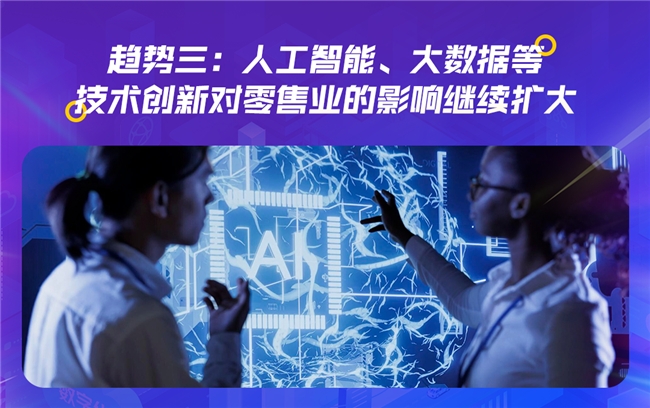
Trend 3: The impact of technological innovations such as artificial intelligence and big data on the retail industry continues to expand.
In 2023, the application of artificial intelligence made a great breakthrough and began to be widely cited in the retail industry, including product digitization, member operation, intelligent customer service, product knowledge base, image processing, marketing and so on.
Some enterprises apply AIGC to the digitalization of commodities, realizing automatic image shooting, AI product matting and animation synthesis. Some enterprises use AI for member operation and marketing design to realize real-time production of copywriting, design and personalized marketing content. From this, we see the broad prospects of artificial intelligence in the retail industry, which will be expanded even more in 2024, and at the same time bring challenges in law, compliance, data security and privacy protection.
On the one hand, technological innovation will bring more efficient and accurate operation mode to the retail industry. Through artificial intelligence and big data analysis, retailers can more accurately predict market demand and consumer behavior, thus optimizing inventory management and sales strategies. This can not only reduce waste and cost, but also improve sales and customer satisfaction.
On the other hand, technological innovation will also bring consumers a more convenient and personalized shopping experience. Through artificial intelligence, Internet of Things, virtual reality, augmented reality and other technologies, consumers can obtain and compare commodity information more conveniently, and at the same time enjoy more personalized services and experiences.
Retailers need to keep up with the pace of scientific and technological development, actively explore and apply new technologies, so as to adapt to the changes in the market and the needs of consumers, and improve their competitiveness and sustainable development ability. At the same time, we also need to pay attention to issues such as data security and privacy protection to ensure that consumers’ rights and interests are protected.
Trend 4: The service upgrade trend is obvious.
In 2023, China launched a set of "combination boxing" to promote consumption-a series of policies and measures to promote consumption continued to be effective, and multi-departments coordinated national consumption promotion activities. From January to November, 2023, the total retail sales of social consumer goods reached 42.8 trillion yuan, up 7.2% year-on-year, of which the year-on-year growth rate in November reached 10.1%, while the growth rate of retail sales of services was as high as 19.5, which significantly enhanced the pulling effect of consumption on economic growth.
With the continuous efforts of the consumption promotion policy, consumer demand is expected to continue to grow in 2024, and the potential of the consumer market is expected to be further released. In such a market environment, consumers are not blindly consuming, but the overall demand is more focused and personalized.
Quality consciousness: consumers pay more and more attention to product quality and brand value.
Personalized demand: customized and personalized products are favored by consumers, especially in the fields of clothing, beauty and home.
Experiential consumption: Experiential consumption, such as tourism, catering and entertainment, has become an important aspect of consumption upgrading.
In order to adapt to these changes, retailers need to constantly innovate and upgrade their business models and services to win the trust and loyalty of consumers.
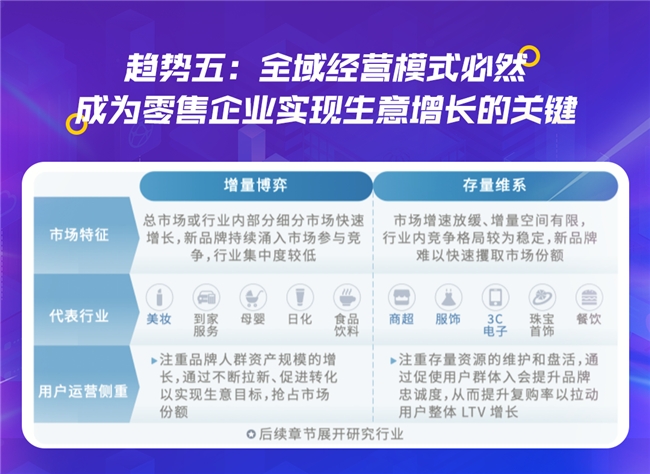
Trend 5: The global business model will inevitably become the key for retail enterprises to achieve business growth.
Under the digital transformation and global trend, the global business model effectively helps enterprises to start to understand traffic, coordinate traffic, series traffic and use traffic again, help enterprises to cover a wider user base and achieve different marketing goals, and achieve high repurchase rate and retention rate.
For example, take a maternal and child brand and an operating fashion brand served by Huibo Technology as examples.
A TOP maternal and infant brand:
In last year’s Double Eleven, the brand achieved global scientific management, in addition to using UD content of the platform+Gravitational Rubik’s Cube to plant grass omni-directionally, reaching out to users’ consumption, and at the same time, with the help of Huibo customer management platform, the combination of global serialization was launched based on the target group of brand users, and global reach such as CRM short messages and intelligent AI outbound calls was achieved. In the end, it generated 1.4 billion yuan in omni-channel revenue and achieved precise marketing in the era of all-media management.
A fashion operation brand:
During the period of double 11 last year, the brand took the trump card product as the first contact, planted grass and stored water in advance from outside the station in the form of talent wearing+shopping strategy+community recommendation, and took short video+shopping as the content undertaking in the station, carried out multi-platform and multi-form exposure, spread the brand volume and reached potential customers, and combined with star IP and high-quality goods of the same paragraph to build the brand’s global communication ability. These actions brought considerable growth to the brand in the double 11 cycle last year, with GMV increasing by 34% year-on-year, ranking second in the industry (promoted by 3 places), and the number of buyers increasing by 15% year-on-year, achieving an efficient explosion.

Trend 6: Cross-border e-commerce is expected to become a new growth point.
According to relevant research reports, the cross-border e-commerce market in China will reach 10.5 trillion yuan in 2020, up 16.6% year-on-year. It is estimated that by 2024, the cross-border e-commerce market in China will reach 15.7 trillion yuan, with a compound annual growth rate of 11.3%.
In addition, according to the data of the General Administration of Customs, in the first half of 2021, the import and export volume of cross-border e-commerce in China was 886.7 billion yuan, up 28.6% year-on-year. Among them, the export was 604.3 billion yuan, a year-on-year increase of 28.4%; Imports reached 282.4 billion yuan, a year-on-year increase of 29.4%.
These data show that the cross-border e-commerce market in China has great development potential. With the continuous growth of the global e-commerce market and the diversification of consumer demand, cross-border e-commerce is expected to become a new growth point. At the same time, policy support and the improvement of international trade environment, the improvement of infrastructure such as logistics and payment, and the promotion of technological innovation also provide favorable conditions for the development of cross-border e-commerce.
However, cross-border e-commerce also faces some challenges, such as cultural differences, tax policies and intellectual property protection. Therefore, retail enterprises need to strengthen market research and compliance management when laying out cross-border e-commerce to meet these challenges.

Trend 7: The basic guarantee function of data security is increasingly prominent.
With the development of digitalization, data, as a core factor of production, has become a basic strategic resource, and the basic guarantee role of data security has become increasingly prominent.
The data of retail enterprises is huge, involving consumers, transactions and commodities. With the improvement of consumers’ legal awareness and the continuous improvement of national supervision mechanism, high requirements are put forward for data collection, storage and use.
However, the concept and architecture of data governance in retail enterprises are relatively traditional, resulting in the contradiction between high data usage and low governance level. If it is not handled well, it may rise to administrative punishment or even judicial level. Cases in this regard are not uncommon in the industry.
In order to ensure the security of data, enterprises need to establish a perfect data security management system, adopt effective technical means and safety measures, and improve employees’ safety awareness and operation skills, so as to ensure the data security of enterprises in all directions.

Trend 8: Unmanned retail will improve the current retail pattern.
With the development of emerging technologies such as big data, artificial intelligence, cloud computing and mobile payment, the technology of unmanned retail convenience stores is becoming more and more mature. According to Ai Media Consulting analysts, unmanned retail, as a new format of the new retail industry, can save labor costs and penetrate into the full-time consumption scene, and has certain development potential.
Second, how to break the global digital operation of the retail industry in 2024?
As a leading global consumer digital operation service provider in China, Huibo Technology has been committed to helping retail enterprises build a digital consumer ecosystem and enhance the value of consumer assets. Up to now, Huibo Technology has provided related services for 300,000+retail enterprises or brand customers to build consumers’ digital ecology, with rich experience and outstanding performance.
1. Providing customized solutions: Huibo Technology can provide customized digital operation solutions for consumers according to the characteristics and needs of different retail enterprises. Through in-depth understanding of the business and objectives of enterprises, Huibo Technology can provide enterprises with digital technology and operation strategies that meet their needs, and help enterprises achieve more efficient management and better user experience.
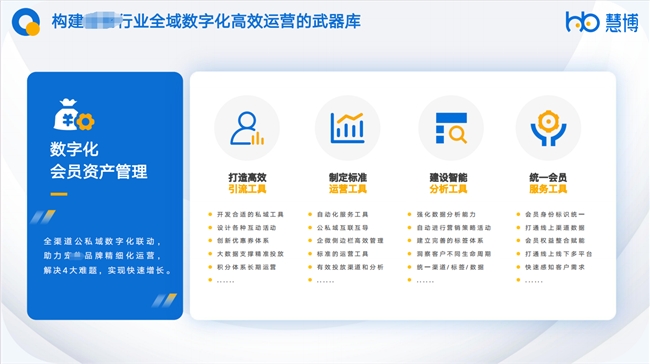
2. Integrating online and offline global data: Huibo Technology can help retail enterprises to integrate online and offline global data and realize omni-channel digital operation. Through data analysis ability and technical application, Huibo Technology can help enterprises to deeply understand consumers’ needs and behaviors and provide consumers with more accurate personalized services and marketing promotion. At the same time, through data sharing and channel collaboration, the interaction and conversion rate between channels can be improved.
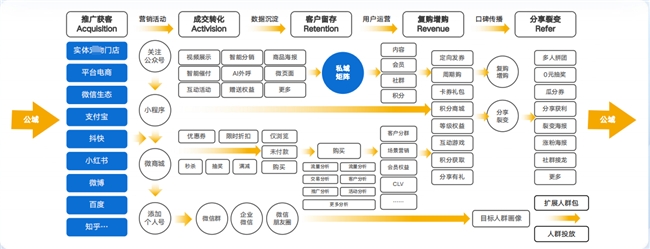
3. Establish and improve the membership system: Huibo Technology can help retail enterprises to establish and improve the membership system and improve the loyalty and stickiness of corporate consumers. Through the establishment and improvement of the membership system, consumer data and membership information can be better managed, and more personalized services and discounts can be provided for members. At the same time, through member marketing and data analysis, we can improve the repurchase rate and consumption of members and help retail enterprises achieve sustained growth.

4. Innovative digital marketing: Huibo Technology can innovate the promotion and application of digital marketing and improve brand awareness and user stickiness. For example, accurate advertising and content marketing can be carried out through platforms such as social media and short videos; Through data analysis, personalized recommendation and precise marketing can be realized. At the same time, offline activities and online interaction can be combined to improve consumer participation and interactivity.
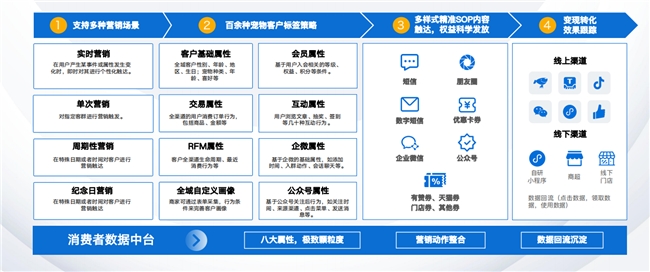
5. Provide all-round service support: Huibo Technology can provide all-round service support to help retail enterprises realize digital transformation. Including project planning, technology selection, system integration, data security and other aspects of support, as well as professional consulting and operation service team to provide enterprises with a full range of digital solutions and after-sales operation service support.
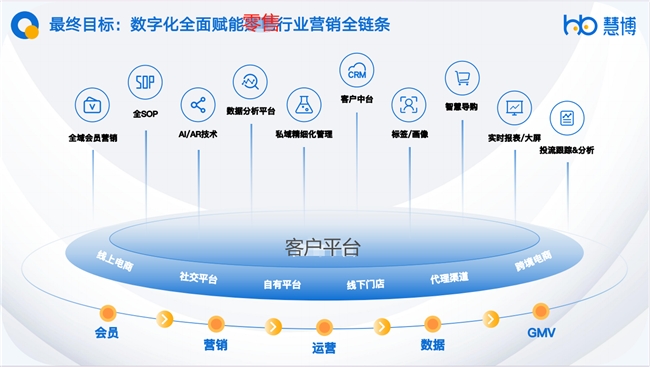
Write it at the end
With the rapid development of science and technology, the retail industry is welcoming a new wave of digital development in 2024. In this change, how to catch the market pulse and find new growth points has become an important topic for every enterprise decision-maker.
Huibo Technology, as the leading global consumer digital operation service provider in China, is not only committed to the innovation and application of technology, but also plays the dual role of leader and practitioner in helping enterprises realize digital transformation.
Facing the future, Huibo Technology firmly believes that only by embracing change and continuous innovation can we stand out in the fierce market competition. We look forward to working with more retail enterprises to explore new paths of digital development and help more retail enterprises achieve long-term development.
Disclaimer: This article is reprinted by our website, aiming to provide readers with more news information. The contents involved do not constitute investment and consumption suggestions, and are for readers’ reference only.
关于作者